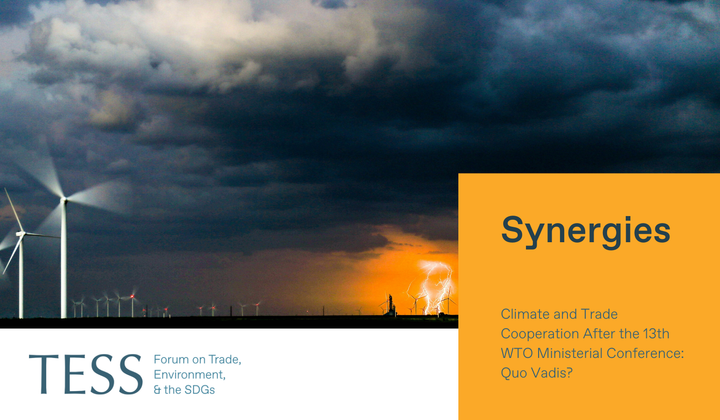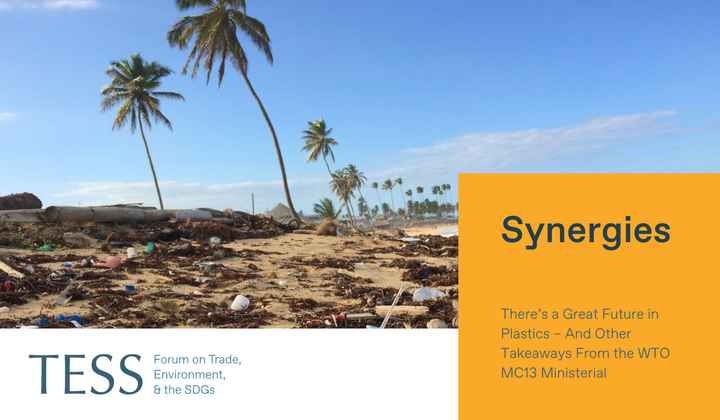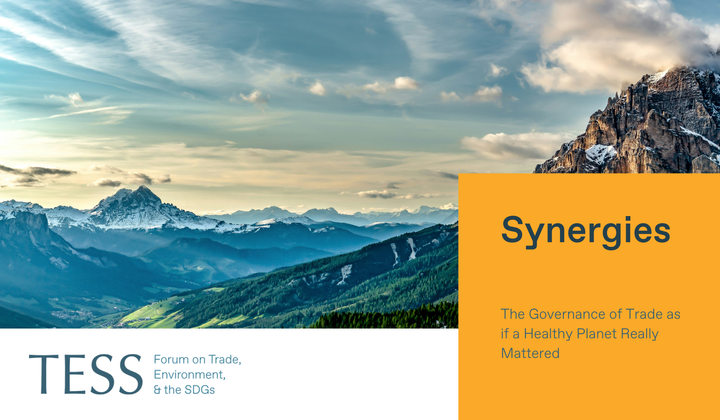As part of the post-MC13 assessment, it is important to recognize that a broad range of ministerial statements made at MC13 highlight the relevance of environmental concerns to trade and express interest in pursuing cooperation in the WTO’s multilateral setting.
This article is part of a Synergies series on reviving multilateralism curated by TESS titled From Vision to Action on Trade and Sustainability at the WTO. Any views and opinions expressed are those of the author(s) and do not necessarily reflect those of TESS or any of its partner organizations or funders.
-----
In the wake of the Thirteenth Ministerial Conference (MC13) of the World Trade Organization (WTO), there has been considerable dismay among advocates of trade policies that advance sustainability objectives about the failure of governments to conclude phase two of the fisheries negotiations and the absence of explicit commitment, or even mention, in the Abu Dhabi Ministerial Declaration of the importance of cooperation on issues of environment and climate. This disappointment is well-justified and the broader impacts on the relevance of the multilateral trade system should not be underestimated.
That said, the geopolitical tensions, short-term electoral considerations, ineffective negotiating processes, and hostage-taking tactics that led to failure at MC13 should not cloud recognition that the vast majority of WTO members did, in many respects, demonstrate they are ready to engage and build cooperation on sustainability and trade at the WTO. As governments and stakeholders assess MC13 and the ways forward, it is important to acknowledge failures while also recognizing important ongoing progress, albeit incremental, and its value.
Failure at MC13 should not cloud recognition that the vast majority of WTO members did, in many respects, demonstrate they are ready to engage and build cooperation on sustainability and trade at the WTO.
What Emerged (or Not) From MC13?
After more than 20 years of negotiations, the failure to reach an agreement to discipline subsidies that contribute to the global decline of fish stocks and directly threaten the livelihoods of fishing communities, food security, and the sustainability of shared natural resources raises significant doubts about the commitment of certain members to achieve the 2030 UN Sustainable Development Goals. While the Agreement on Fisheries Subsidies concluded at MC12 constituted a significant achievement, it remains a partial deal and leaves unaddressed critical aspects that are vital to securing sustainability of fish stocks. At MC13, a number of additional members ratified the agreement, bringing the total to 71, but it is still 39 short of the number needed to enter into force. It is now more urgent than ever to pick up the work in Geneva where ministers left it and conclude the talks by MC14 if not before, as called for by the Director-General in her closing speech.
On broader sustainability issues, a strong ministerial-level commitment to strengthen international cooperation on agriculture and food security, global environmental challenges, and wider sustainable development priorities in the multilateral setting was not only long overdue, but would have provided vital renewed political impetus and orientation for further work.
At MC13, there was an urgent need, for instance, for ministers to build on the recognition at MC12 of the relevance of global environmental challenges, including climate change and related natural disasters, biodiversity loss, and pollution, and provide political guidance on the way forward. Collectively, ministers failed in this regard. The Abu Dhabi Ministerial Declaration does reassert the importance of sustainable development as an overarching objective of the WTO. It also recognizes the “short-term challenges faced by Members, in particular developing Members, including LDCs [least developed countries], confronting global and domestic crises including disasters caused by natural hazards” and “encourage[s] relevant WTO bodies to continue Member-driven work, aimed at supporting resilience and disaster preparedness.” However, the absence of explicit mention of how to consolidate growing engagement on environment and climate over the past few years and strengthen cooperation at the WTO is hugely disappointing.
Nonetheless, as part of the post-MC13 assessment, it is important to recognize that a broad range of ministerial statements made at MC13 by regional and other political groupings, individual WTO members, and on behalf of the three member-led initiatives on environment highlight the relevance of environmental concerns to trade and express interest in pursuing cooperation in the WTO’s multilateral setting.
Meeting on the eve of MC13, for instance, the Coalition of Trade Ministers of Climate issued a Communiqué and Menu of Voluntary Actions. Now with 61 ministers from a diverse range of countries, the coalition reinforced one of its core priorities, namely to “[f]oster international cooperation and collective action to promote trade and trade policies that pursue climate action across the WTO.” Their Communiqué underlined “the importance of making the WTO more responsive to global environmental challenges,” and called for “ambitious, concrete and forward-looking commitments in the WTO Ministerial Declaration on how trade, trade policy and the WTO can support the global response to the climate crisis, bearing in mind sustainable development.” The coalition’s Menu of Voluntary Actions sets out eight action items that can be taken at the ministerial level by members, either collectively or individually, depending on their respective priorities and national capacities, including “[a]ctively engag[ing] in the WTO on the nexus of trade, climate and sustainable development.”
An additional development at MC13 was a Ministerial Declaration on the Contribution of the Multilateral Trading System to Tackle Environmental Challenges co-sponsored by almost 70 developing countries. The specifics of the statement are worthy of attention because they demonstrate the engagement and interest of developing countries in substantive discussion of climate, environment, and sustainable development priorities, countering the false narrative that all developing countries are opposed to taking up such topics at the WTO.
Their declaration highlights, for instance, the support of co-sponsors for coherent, open, member-driven, consensus-based, and inclusive discussion of trade and environment issues across WTO bodies. It encourages enhanced transparency and multilateral cooperation on trade-related environmental measures; dialogue on how to promote trade that supports sustainable development and just transitions; and trade cooperation on incentives for sustainably produced goods and climate technologies. The co-sponsors also emphasize the importance of enhancing coherence between international environmental regimes and trade regimes, calling on all members to refrain from imposing unilateral measures that create unnecessary obstacles to trade or arbitrary or unjustifiable discrimination, and highlights links between sustainability in trade and climate finance.
Many developed and developing countries presented perspectives and priorities related to environmental challenges in their ministerial statements, and supported the continued revitalization of discussions on these topics in the Committee on Trade and Environment.
In addition, many developed and developing countries presented perspectives and priorities related to environmental challenges in their ministerial statements, and supported the continued revitalization of discussions on these topics in the Committee on Trade and Environment (CTE). For instance, statements from the Organisation of African, Caribbean and Pacific States, the Pacific Group, and the LDC group, along with those of a range of Latin American countries emphasized concerns about the scale and impact of environmental crises, their relevance to the countries’ economic and trade priorities, or noted specific topics for enhanced cooperation—from trade policy solutions to support climate change adaptation, supporting participation in green value chains, and incentives for sustainable production to the role of trade in ensuring global dissemination of low-carbon technologies and services. Many emphasized the need to assist developing countries, including LDCs, small island developing states, and small, vulnerable economies, in meeting trade-related environmental challenges, calling for collective and collaborative approaches to integrating sustainable practices and climate considerations into trade policies.
In addition, over half of the WTO’s membership, covering more than 85% of global trade, reinforced their support for one or more of the three member-led initiatives on environmental sustainability, plastic pollution, and fossil fuel subsidy reform. Notably, the Dialogue on Plastics Pollution (DPP), which now brings together 78 WTO members, circulated a ministerial statement that identifies areas for international cooperation on the trade dimensions of plastic pollution, including through voluntary individual and collective actions, and calls for further concrete, pragmatic, and effective outcomes at the latest by MC14.
Similarly, the co-convenors of the Trade and environmental Sustainability Structured Discussions (TESSD) issued a statement, an updated work plan, and a series of outcome documents summarizing the work of its four working groups on environmental goods and services, trade‑related climate measures, circular economy – circularity, and subsidies. Importantly, the co-convenor statements emphasize the goal of delivering concrete results by MC14.
Finally, co-sponsors of the Fossil Fuel Subsidy Reform (FFSR) initiative issued an updated ministerial statement and a set of options to advance reform focusing on enhancing transparency by making fuller use of the Trade Policy Review Mechanism; developing practical guidelines to ensure that subsidies introduced to address the energy crises remain targeted, transparent, and temporary; and examining current forms of support to identify the characteristics of the most harmful ones to the environment and trade and considering possible pathways to reform them.
Looking Ahead: A More Proactive Response
A key priority—and expectation—from many stakeholders is for the WTO to respond more explicitly and proactively to global environmental challenges, especially the climate crisis, and to wider sustainable development priorities.
Each of the efforts noted above play a key role in building shared understanding and cooperation on trade and sustainability among WTO members. Beyond MC13, a key priority—and expectation—from many stakeholders is for the WTO to respond more explicitly and proactively to global environmental challenges, especially the climate crisis, and to wider sustainable development priorities. Looking ahead, members can and should harness the growing range of venues at the WTO to exchange perspectives on challenges and opportunities, identify pathways for cooperation, and forge concrete outcomes.
First, governments and stakeholders should continue to support ongoing efforts to revitalize multilateral deliberations in the CTE. In a sign of the potential to "reform by doing," a first CTE thematic session was held in late 2023, focusing on trade contributions to energy transition efforts concerning climate adaptation and mitigation. Further such thematic sessions of the CTE are expected and can play a central role in fostering much-needed focused multilateral dialogue and cooperation on specific issues.
Second, beyond the CTE, governments can continue to highlight sustainability issues in various relevant WTO councils and bodies, including the councils responsible for goods, services, and intellectual property; the committees responsible for agriculture, development, and technical barriers to trade; and the working groups responsible for trade and technology transfer, and on trade, debt, and finance. Across these fora, WTO members can share national experiences, discuss best practices and concrete proposals, and fulfil their commitments to transparency of environment-related trade measures.
Third, ongoing discussions in the three member-led initiatives, namely the DPP, TESSD, and FFSR initiative, will continue to have a vital, complementary function as incubators of options for inclusive, collaborative action, while providing a non-negotiating venue to explore emerging issues and connect the dots between discussions currently occurring in silos in different parts of the WTO system. Faced with long-standing difficulties in reaching multilateral consensus, they can explore creative ways to revitalize and make multilateralism work. Here, soft law approaches in the form of best practices, voluntary actions, commitments, and guidelines are examples of outcomes that can both sustain the relevance of the multilateral trading system and support policy actions at the national and regional level. In the year ahead, each initiative will need to frame their ongoing work and meetings in ways that support preparations for concrete outcomes at MC14.
Fourth, the ninth Aid for Trade Global Review in June 2024 with a theme of “mainstreaming trade” offers opportunities to explore how aid for trade can support trade-related contributions and responses to the sustainable development priorities of developing countries, including in relation to environmental challenges.
Finally, there is an opportunity to better harness the expertise, convening power, and good offices of the WTO Secretariat to provide data and analysis on sustainability and trade that can support the work of members and foster and support engagement with key international partners. In this respect, one should highlight the precedent created by the Ministerial Decision on the Work Programme on Small Economies adopted at MC13, which instructs the Secretariat to provide relevant information and factual analysis for discussion in the Committee on Trade and Development on “exploring with other relevant WTO bodies how to integrate trade related climate change adaptation and mitigation policies into the trade policies of small economies.” The WTO’s Director General, Dr. Ngozi Okonjo-Iweala, has demonstrated her commitment to a trading system that works for people and the planet, and has been a powerful advocate of the WTO and trade playing a more prominent role in the global response to the climate agenda. A clearer work programme and mandate from members would serve to provide guidance on emerging new and pragmatic roles for the WTO Secretariat—a discussion that inevitably needs to happen.
Trade and the multilateral trading system have a central role to play in contributing to global efforts to address sustainability challenges. It is right for the WTO’s relevance and credibility to be judged by its ability to respond—swiftly—to urgent environmental crises, and to do so in ways that are effective, just, and address wider sustainable development priorities. We can take hope in the fact that the vast majority of WTO members did demonstrate that they are ready to engage and build cooperation on sustainability and trade at the WTO. Now is the time to capitalize on this growing engagement and invest more in making the multilateral trading system work for sustainability.
-----
Carolyn Deere Birkbeck is Founder and Executive Director, Forum on Trade, Environment, & the SDGs (TESS).
Christophe Bellmann is Head of Policy Analysis and Strategy, Forum on Trade, Environment, & the SDGs (TESS).
-----
Synergies by TESS is a blog dedicated to promoting inclusive policy dialogue at the intersection of trade, environment, and sustainable development, drawing on perspectives from a range of experts from around the globe. The editor is Fabrice Lehmann.
Disclaimer
Any views and opinions expressed on Synergies are those of the author(s) and do not necessarily reflect those of TESS or any of its partner organizations or funders.
License
All of the content on Synergies is licensed under a Creative Commons Attribution-NonCommercial-ShareAlike 4.0 International (CC BY-NC-SA 4.0)
license. This means you are welcome to adapt, copy, and share it on your platforms with attribution to the source and author(s), but not for commercial purposes. You must also share it under the same CC BY-NC-SA 4.0 license.
If you would like to reuse any material published here or if you have any other question related to Synergies, send an email to fabrice.lehmann@graduateinstitute.ch.



